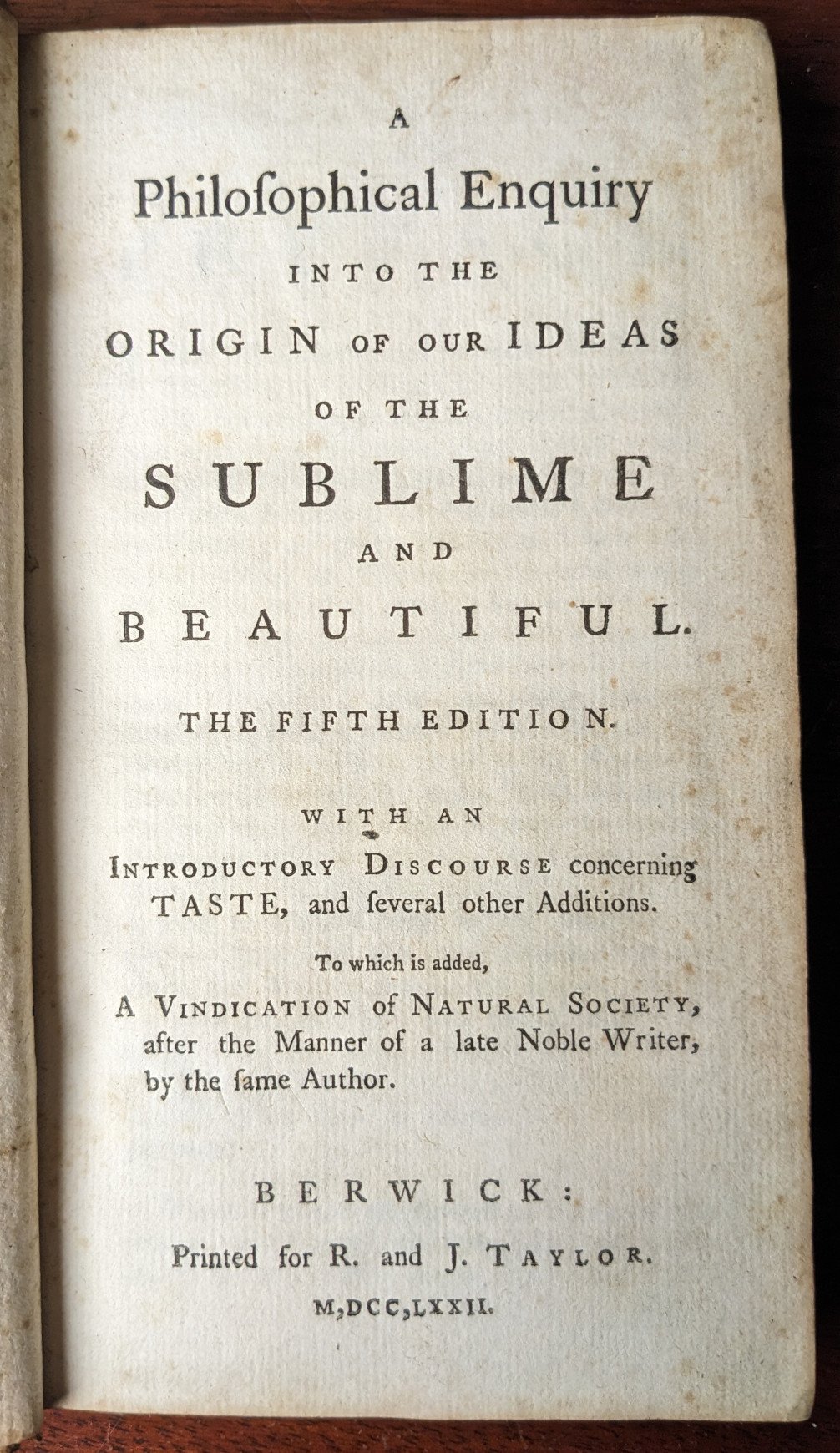 Image 1 of 4
Image 1 of 4

 Image 2 of 4
Image 2 of 4

 Image 3 of 4
Image 3 of 4

 Image 4 of 4
Image 4 of 4





1772 - Origin of The Gothic
Edmund Burke (1729-1797) was an Irish statesman, author, orator, political theorist, and philosopher. His works reveal an undeniable appreciation for the power of the unseen and the limits of human reason.
Burke's most evident connection to esotericism lies in his philosophical treatise, A Philosophical Enquiry into the Origin of Our Ideas of the Sublime and Beautiful (1757). In this work, he explores the emotional impact of the sublime, an experience evoked by vastness, obscurity, and power, often associated with the awe-inspiring forces of nature. This concept of the sublime, with its emphasis on the emotional and the transcendent, resonated with the Romantic movement and influenced later thinkers who explored the mystical dimensions of human experience. This book, with its focus on the "delightful horror" evoked by vastness, obscurity, and power, profoundly shaped the Gothic aesthetic. By linking terror and awe to the sublime, Burke provided a philosophical framework for Gothic writers to explore the emotional impact of ruined castles, shadowy landscapes, and supernatural encounters. His emphasis on the subjective experience of the sublime paved the way for Gothic's exploration of intense emotions, psychological states, and the unsettling beauty of the macabre. This is a provincially published, late eighteenth-century edition of Burke's highly influential treatise. In excellent condition.
1772. Edmund Burke. A Philosophical Enquiry into the origin and ideas of the sublime and beautiful. Berwick: Printed for R. and J. Taylor. 12mo. vii, [5], 194, viii, 62pp. Contemporary gilt-tooled calf, contrasting red morocco lettering-piece. Rubbed, a trifle marked, joints starting, loss to head of spine. Scattered spotting.
Edmund Burke (1729-1797) was an Irish statesman, author, orator, political theorist, and philosopher. His works reveal an undeniable appreciation for the power of the unseen and the limits of human reason.
Burke's most evident connection to esotericism lies in his philosophical treatise, A Philosophical Enquiry into the Origin of Our Ideas of the Sublime and Beautiful (1757). In this work, he explores the emotional impact of the sublime, an experience evoked by vastness, obscurity, and power, often associated with the awe-inspiring forces of nature. This concept of the sublime, with its emphasis on the emotional and the transcendent, resonated with the Romantic movement and influenced later thinkers who explored the mystical dimensions of human experience. This book, with its focus on the "delightful horror" evoked by vastness, obscurity, and power, profoundly shaped the Gothic aesthetic. By linking terror and awe to the sublime, Burke provided a philosophical framework for Gothic writers to explore the emotional impact of ruined castles, shadowy landscapes, and supernatural encounters. His emphasis on the subjective experience of the sublime paved the way for Gothic's exploration of intense emotions, psychological states, and the unsettling beauty of the macabre. This is a provincially published, late eighteenth-century edition of Burke's highly influential treatise. In excellent condition.
1772. Edmund Burke. A Philosophical Enquiry into the origin and ideas of the sublime and beautiful. Berwick: Printed for R. and J. Taylor. 12mo. vii, [5], 194, viii, 62pp. Contemporary gilt-tooled calf, contrasting red morocco lettering-piece. Rubbed, a trifle marked, joints starting, loss to head of spine. Scattered spotting.
Edmund Burke (1729-1797) was an Irish statesman, author, orator, political theorist, and philosopher. His works reveal an undeniable appreciation for the power of the unseen and the limits of human reason.
Burke's most evident connection to esotericism lies in his philosophical treatise, A Philosophical Enquiry into the Origin of Our Ideas of the Sublime and Beautiful (1757). In this work, he explores the emotional impact of the sublime, an experience evoked by vastness, obscurity, and power, often associated with the awe-inspiring forces of nature. This concept of the sublime, with its emphasis on the emotional and the transcendent, resonated with the Romantic movement and influenced later thinkers who explored the mystical dimensions of human experience. This book, with its focus on the "delightful horror" evoked by vastness, obscurity, and power, profoundly shaped the Gothic aesthetic. By linking terror and awe to the sublime, Burke provided a philosophical framework for Gothic writers to explore the emotional impact of ruined castles, shadowy landscapes, and supernatural encounters. His emphasis on the subjective experience of the sublime paved the way for Gothic's exploration of intense emotions, psychological states, and the unsettling beauty of the macabre. This is a provincially published, late eighteenth-century edition of Burke's highly influential treatise. In excellent condition.
1772. Edmund Burke. A Philosophical Enquiry into the origin and ideas of the sublime and beautiful. Berwick: Printed for R. and J. Taylor. 12mo. vii, [5], 194, viii, 62pp. Contemporary gilt-tooled calf, contrasting red morocco lettering-piece. Rubbed, a trifle marked, joints starting, loss to head of spine. Scattered spotting.
